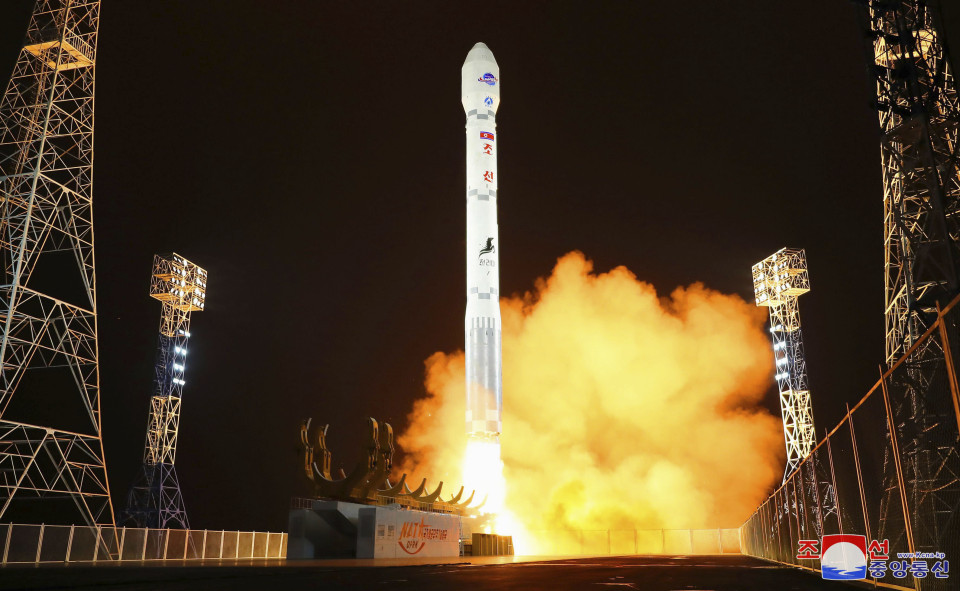North Korea said Wednesday that it launched a military reconnaissance satellite the previous day that entered orbit as planned, prompting Japan and the United States to condemn Pyongyang for violating U.N. Security Council resolutions.
While North Korea's official media said the satellite launch was successful, Japan, which had urged Pyongyang not to conduct a launch using ballistic missile technology, said it had not confirmed whether the payload had entered space.

The launch took place around 10:42 p.m. and the Malligyong-1 reconnaissance satellite was placed in orbit about 12 minutes later, the official Korean Central News Agency said.
The Japanese government said the projectile split into multiple parts, one of which flew over the southern prefecture of Okinawa.
Japan lodged a protest via its embassy in Beijing over the launch, saying it violated U.N. resolutions banning the use of ballistic missile technology by Pyongyang, while the United States condemned North Korea for the flight of "a space launch vehicle."
North Korea had notified Japan of its plan to launch a satellite during a nine-day window commencing Wednesday, before it fired the projectile prior to the start of the period.
South Korea's Joint Chiefs of Staff said an assumed military satellite was launched in a southward direction from Tongchang-ri in North Korea's northwest.
On Wednesday, South Korea's Cabinet approved a motion to partially suspend an inter-Korean military accord signed in 2018, following the launch by Pyongyang. President Yoon Suk Yeol also endorsed the proposal.
No damage was reported in Japan as a result of the launch, Tokyo's top government spokesman, Hirokazu Matsuno, said.

One part of the projectile fell into the East China Sea, about 350 kilometers off the Korean Peninsula, at around 10:50 p.m., while another piece dropped into the Pacific Ocean around 1,200 kilometers southwest of Japan's southernmost Okinotori Island at around 10:57 p.m., the chief Cabinet secretary said.
Japan is still analyzing whether the launch was successful, Senior Vice Defense Minister Hiroyuki Miyazawa said.
Japan's J-Alert warning system said the missile apparently flew over the Pacific Ocean around 10:55 p.m. It issued a warning to residents of Okinawa to take shelter but lifted it a short time later.
"It is a serious situation in which the safety of our people has been endangered," Prime Minister Fumio Kishida told reporters at his office.
"We have already sternly protested to North Korea and condemned the launch in the strongest possible terms," he said, adding Japan will coordinate closely with South Korea and the United States on how to respond.


Tuesday's launch followed two unsuccessful attempts by Pyongyang this year to place a military reconnaissance satellite into orbit.
After the failed attempts in May and August, North Korea announced it would launch another one in October but did not follow through.
Since North Korea made a similar announcement in May, Japan has had a standing order for its Self-Defense Forces to destroy any projectile that appears poised to fall within the country's territory using ground-based Patriot Advanced Capability-3 interceptor missiles and Aegis-equipped destroyers.
Following a meeting between North Korean leader Kim Jong Un and Russian President Vladimir Putin in the Russian Far East in September, concern grew regarding potential assistance and guidance from Moscow for a spy satellite launch by Pyongyang.

North Korea claimed Tuesday that "the U.S. and its vassal forces' reckless space militarization" compelled Pyongyang to accelerate "space development for self-defense," including the use of a military reconnaissance satellite, according to KCNA.
Pyongyang has a "sovereign right no one can deny" to bolster its defense capabilities to address the U.S.-led expansion of space monitoring and missile defense systems that are being integrated into dangerous offensive forces, KCNA quoted Ri Song Jin, a National Aerospace Technology Administration researcher, as saying.
North Korea appears to believe that a military reconnaissance satellite is necessary for detecting potential surprise attacks by the United States and South Korea, with its development stipulated in a five-year national defense plan from 2021.
Related coverage:
North Korea claims it successfully put satellite into orbit
North Korea notifies Japan of new 9-day satellite launch window
Japan, S. Korea leaders vow joint response to N. Korea, close contact










